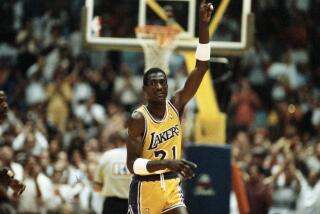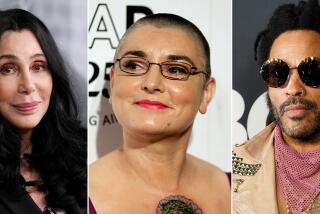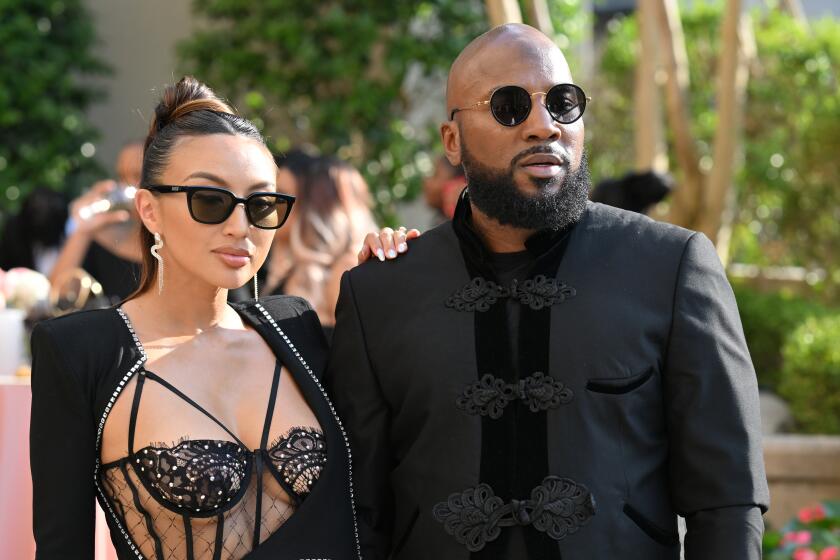John Sykes, new chairman of the Rock and Roll Hall of Fame, pledges diversity, populism
The Rock and Roll Hall of Fame will begin a new era on Jan. 1 with a new chairman, John Sykes, iHeartMedia‘s president of entertainment enterprises. He was selected by the board of directors of the Rock and Roll Hall of Fame Foundation to take the reins after being nominated by current chairman Jann Wenner, the 73-year-old longtime editor of Rolling Stone magazine who announced this week that he will step down from the organization he co-founded in 1983.
Sykes, part of the original management team at MTV and VH1 before he joined iHeartMedia, becomes just the third chairman of the Rock Hall, following in the footsteps of founding chairman Ahmet Ertegun, co-founder of Atlantic Records, and Wenner, who stepped into the unpaid post after Ertegun died in 2006.
“When they told me I had the job, I fell out of my chair,” Sykes said by phone Wednesday, the day his appointment was announced. “I did not see this coming. I was shocked and elated. This is an incredible way to connect with my first love, music.”
Sykes, 64, takes over at an auspicious time for the institution that was created in 1983, held its first induction ceremony in 1986 at the Waldorf Astoria Hotel in New York and opened the physical museum in 1995 in Cleveland, where some 13 million people have visited since that opening.
Sykes said “the most important mandate” he’s taking into the job is a reshaping of the board to better reflect the diversity of the general population, meaning he’ll be actively recruiting more women and people of color. The organization has taken hits over time for catering to white male musicians, and by extension, music fans.
“Like any good institution,” Sykes said, “we must constantly reinvent, otherwise we’ll be left behind. We have to rebuild our board in a way that reflects and speaks to the artists that are now eligible for induction. That means more women and more people of color.”
You said you were surprised that Wenner nominated you. There must have been a lot of other people interested in the job. Was there a lot of jockeying for that nomination?
There are a lot of people who could have done this job very well. The Rock and Roll Hall of Fame is such a cohesive unit that whoever Jann offered, the board was going to support it. There was no backroom lobbying, no gaming. It was pretty much Jann nominated someone, and they voted on it.
What are the big challenges you see for the organization going forward?
First of all, we’ve got to expand. We have hundreds of thousands of people going through the doors and we need to grow physically. We also need to leverage all the technologies that exist today to allow fans everywhere to connect with the music. But the most important mandate is to rebuild our board; we have to modernize the way we think and create a more diverse board to reflect the artists who are becoming eligible. It’s no longer the artists of the ’50s and ’60s, and we have to have a board with knowledge that speaks to that.
The hall in general, and the annual induction ceremony in particular, have taken their share of jabs over the years: too many inductees, not enough inductees, hip-hop isn’t “rock ‘n’ roll,” too few women are in, there’s a bias against heavy metal and progressive rock. What’s your view on those arguments?
Having been on the board for 25 years, I recognize that the Rock and Roll Hall of Fame is no longer about a single genre of music. It’s about all the music that aspires to connect with young people. Jon Landau [head of the nominating committee] has always pointed out that every record that Motown put out had the words “The Sound of Young America” written on the label. That’s what the Rock and Roll Hall of Fame is about. It’s not about genre, it’s about the music that changed our culture. This year [rapper] Notorious B.I.G. is eligible and I think he has a good shot at getting in.
One big change in recent years was the addition of fan voting, even though the results don’t significantly contribute to the overall voting for who gets inducted. But it does demonstrate to the 1,000 or so voting members who the public favors — how important is that to consider?
Two things have really helped us modernize. One was the fan voting. It doesn’t truly determine the inductees, but it shows fans we are listening. Number two was the change in the makeup of the nominating committee. We are constantly looking at evolving the committee. Tom Morello from Rage Against the Machine came in one time and stood up and said “Heavy metal is a category of music of the people. Why aren’t bands like Kiss and Rush in the Rock and Roll Hall of Fame?” He was very persuasive. You have to credit Jon Landau, because he said “I get it.” We have to reflect what fans truly love.
But there’s often been dynamic tension between what’s popular and what’s musically great and artistically or culturally significant, and they don’t always go hand in hand. How do you balance those things?
It’s a healthy tension. It keeps the committee on point. There are people who argue both sides to this day. It’s a healthy debate — sometimes you get what you want and sometimes you don’t.
What other changes do you envision under your leadership?
I want to expose as many people as possible to all the incredible music that surrounds us. My mantra for my entire career has been, “If you want to win, follow the artists,” because they are the blood that flows through the veins of all our business. We will be celebrating those artists, whether fans go to the physical building in Cleveland or see what we’re doing on Instagram or YouTube, we want to be everywhere. We have new board members. The induction ceremony will be live [on HBO] next year instead of taped. We’re also looking to do a lot more in California, because it is a cornerstone of the music business.
The best time to reinvent is when you’re on top of the game. The Rock and Roll Hall of Fame is setting new attendance records, it has gained recognition as a true cultural institution. I think now is our chance.
More to Read
The biggest entertainment stories
Get our big stories about Hollywood, film, television, music, arts, culture and more right in your inbox as soon as they publish.
You may occasionally receive promotional content from the Los Angeles Times.






